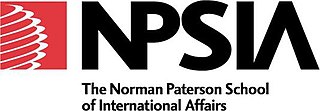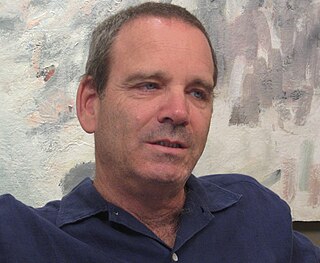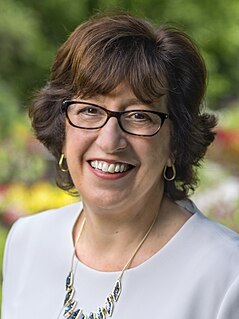
The United States National Security Council (NSC) is the principal forum used by the President of the United States for consideration of national security, military, and foreign policy matters. Based in the White House, it is part of the Executive Office of the President of the United States, and composed of senior national security advisors and Cabinet officials.

An intelligence agency is a government agency responsible for the collection, analysis, and exploitation of information in support of law enforcement, national security, military, and foreign policy objectives.
Military science is the study of military processes, institutions, and behavior, along with the study of warfare, and the theory and application of organized coercive force. It is mainly focused on theory, method, and practice of producing military capability in a manner consistent with national defense policy. Military science serves to identify the strategic, political, economic, psychological, social, operational, technological, and tactical elements necessary to sustain relative advantage of military force; and to increase the likelihood and favorable outcomes of victory in peace or during a war. Military scientists include theorists, researchers, experimental scientists, applied scientists, designers, engineers, test technicians, and other military personnel.

Joseph Samuel Nye Jr. is an American political scientist. He and Robert Keohane co-founded the international relations theory of neoliberalism, which they developed in their 1977 book Power and Interdependence. Together with Keohane, he developed the concepts of asymmetrical and complex interdependence. They also explored transnational relations and world politics in an edited volume in the 1970s. More recently, he pioneered the theory of soft power and explained the distinction between it and hard power. His notion of "smart power" became popular with the use of this phrase by members of the Clinton Administration and the Obama Administration.

The Ministry of State Security is the civilian intelligence, security and secret police agency of the People's Republic of China, responsible for counter-intelligence, foreign intelligence and political security. The MSS is active in industrial espionage and increasingly adept at cyber espionage. Its military counterpart is the Intelligence Bureau of the Joint Staff. Described as one of the most secretive intelligence organizations in the world, it is headquartered in Beijing with subordinate branches at the provincial, city, municipality and township levels throughout China.

The Norman Paterson School of International Affairs is a professional school of international affairs at Carleton University that was founded in 1965. The school is based at Richcraft Hall on Carleton's campus in Ottawa, Ontario, Canada. Students, alumni and faculty of NPSIA are referred to as 'NPSIAns'.

The Foreign Intelligence Agency (Polish: Agencja Wywiadu is a Polish intelligence agency tasked with the gathering of public and secret information abroad for the Republic of Poland.

Christopher Maurice Andrew, is an Emeritus Professor of Modern and Contemporary History at the University of Cambridge with an interest in international relations and in particular the history of intelligence services.

Robert J. Plomin, FBA is an American psychologist and geneticist best known for his work in twin studies and behavior genetics. A Review of General Psychology survey, published in 2002, ranked Plomin as the 71st most cited psychologist of the 20th century. He is the author of several books on genetics and psychology.
Bernadotte Everly Schmitt was an American historian who was professor of Modern European History at the University of Chicago from 1924 to 1946. He is best known for his study of the causes of World War I, in which he emphasized Germany's responsibility and rejected revisionist arguments.

The Institute of World Politics (IWP) is a private graduate school of national security, intelligence, and international affairs in Washington, DC, and Reston, Virginia. Founded in 1990, it offers courses related to intelligence, national security, and diplomatic communities.

Margaret Ann "Peggy" Hamburg is an American physician and public health administrator, who is serving as the chair of the board of the American Association for the Advancement of Science (AAAS) and co-chair of the InterAcademy Partnership (IAP). She served as the 21st Commissioner of the U.S. Food and Drug Administration from May 2009 to April 2015.
Informatics is the study of computational systems, especially those for data storage and retrieval. According to ACM Europe andInformatics Europe, informatics is synonymous with computer science and computing as a profession, in which the central notion is transformation of information. In other countries, the term "informatics" is used with a different meaning in the context of library science.

Simon Chesterman is an Australian academic, writer and law professor who is currently the Dean of the National University of Singapore's Faculty of Law and Senior Director for AI Governance at AI Singapore. A Rhodes Scholar, he is also Editor of the Asian Journal of International Law and Co-President of the Law Schools Global League.

Michael Murphy Andregg is known for his study of the causes of war, global problems related to war, sustainable development, intelligence ethics and his peace activism. He founded and directed for 30 years a non-profit organization called Ground Zero Minnesota dedicated to "top-quality, non-partisan education for informed democracy and human survival." Andregg has published numerous articles, study guides, documentaries and papers on biology, genetics, technology and contemporary social problems related to armed conflict. He has produced over 50 educational videos on wide-ranging subjects and his national award-winning book, On the Causes of War, was released in November 1997.

Uri Bar-Joseph is professor emeritus in the Department for International Relations of The School for Political Science at Haifa University. He specializes in national security, intelligence studies, and the Arab-Israeli conflict.

Daniele Ganser is a Swiss author. He is best known for his 2005 book NATO's Secret Armies, an adaption of his 2001 dissertation.
Wesley K. Wark is a Canadian historian, an associate professor emeritus of history at the University of Toronto, and a visiting professor at the University of Ottawa.

Martha Elizabeth Pollack is an American computer scientist who is the 14th president of Cornell University, serving since April 2017. She also serves on the board of directors of IBM. Previously, she served as Provost and Executive Vice President for Academic Affairs at the University of Michigan. Her research specialty is artificial intelligence, where her contributions include works in planning, natural language processing, and activity recognition for cognitive assistance.

Dezinformatsia: Active Measures in Soviet Strategy is a non-fiction book about disinformation and information warfare used by the KGB during the Soviet Union period, as part of their active measures tactics. The book was co-authored by Richard H. Shultz, professor of international politics at Tufts University, and Roy Godson, professor emeritus of government at Georgetown University.















